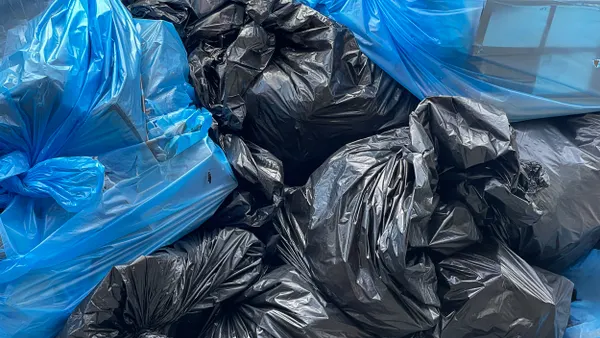Dive Brief:
- The Solid Waste Association of North America (SWANA) is sending a letter to all 50 state environmental agencies with the latest updates and advice on China's new scrap import policies. The letter, signed by SWANA CEO David Biderman, advises agencies to "be prepared for increased market volatility, which is likely to drive greater uncertainty among your stakeholders," and encourages continuous communication.
- When discussing this with local governments, service providers and generators, SWANA recommends reinforcing the importance of high quality material. Education at the generator level and tight standards at the processing level can help ensure bales are coming out closer to China's new 0.3% contamination standard.
- SWANA also recommends that state agencies reinforce waste reduction and the development of more domestic markets, as "both have the potential to reduce reliance on Chinese markets." In addition, the letter suggests that agencies "review current and contemplated recycling goals and regulations in light of current market conditions."
Dive Insight:
This has become an unavoidable issue for the industry since the summer. China has officially announced plans to stop accepting certain commodities by 2018 and set tighter contamination specifications for the rest, while freezing import licenses in the meantime. SWANA, along with groups such as ISRI and NWRA, have been actively working to gain more clarity on these new policies and potentially buy more time before full implementation. As described in SWANA's letter, this has included conversations with officials at multiple federal agencies to enlist their help in communicating with China's Ministry of Environmental Protection (MEP).
The issue was reportedly raised by officials from the U.S. Department of Commerce and Office of the U.S. Trade Representative during a visit to China last month. The topic was again discussed during an Oct. 3 meeting of the World Trade Organization's Committee on Import Licensing. Officials from the European Union, Australia, Canada and South Korea also expressed their concerns about the new scrap policies at that meeting. Yet, as noted in SWANA's letter, "it is unclear whether China will consider any changes to the proposed import ban or contamination standard." So far, MEP "has been reluctant even to clarify some questions about the affected materials and applicable contamination standards."
In the short term, this uncertainty has taken a toll on the stock prices of U.S. waste companies and already led to recycling program cutbacks in multiple states. So far that trend has received some of the most attention in Oregon, but its effects are being felt all along the West Coast and in other states. While some larger city governments may be more well-equipped to handle these changes, that isn't usually the case for their counterparts in smaller municipalities or counties.
Many will be looking to their state agencies for guidance on what to do, particularly in states where disposal of certain recyclable material is prohibited. As noted in SWANA's letter, this may even force some states to reevaluate the expectations or timing for various recycling goals if certain markets temporarily dry up. These agencies may also be instrumental in expediting permits for the creation of any new domestic processing infrastructure that many in the industry are hoping will develop as a result of this situation. All of these needs come at a time when funding and staffing at many state environmental agencies are at their lowest levels in years, meaning the expertise of industry professionals will be especially important in the months ahead.











